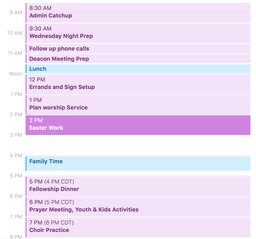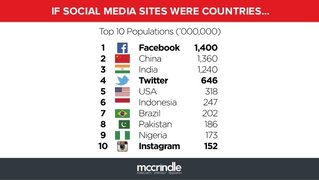|
In high school I watched a movie about a company going through a consultation process that led to a downsizing. During an interview, the consultants (both named Bob) asked the employee "What is it you say you do here?" And the employee can't give an answer. He had no idea exactly what it was he did, why it mattered, and how his work benefited the company. Truth be told, his dream was to create a mat you could jump to conclusions on, so maybe it wasn't much of a loss. But his bumbling raises a greater issue - so many times we just do things because we do them, without exploring why. Earlier today I saw a great post on social media from Micah Fries on how important mission is for the "established church." In established churches, you have in place a lot more layers of organization and structure than in an entrepreneurial church plant or campus (no matter how cluttered your church feels, any established body has its own systems). Unfortunately, in many established churches, the conversation during discussions comes back around to bylaws, policy, and procedure. We need those things in place so we operate consistently and in good stewardship and faithfulness, but when bureaucracy becomes the focal point rather than mission, inevitably will come the inward spiral.
At the core are maintenance and preference, which are the enemies of mission. In maintenance and preference, leaders spend their time making sure things are kept up and people's preferences are met. The reality is though, when you try to please everyone, you please no one. The inward spiral ends up happening because all the energy and attention of not only leaders but also the people is turned in towards themselves, rather than the community around them. As leaders, we have the ability to focus on mission through steering the narrative. Leaders are the primary storytellers for the church, which means we can speak and share about emphasizing the mission. 1. Communicate Consistently - Just when you think you can't say one more thing about the mission, keep talking. It's only when you're tired of it that people are hearing it and absorbing it. And it has to be a message that's shared across platforms, in multiple publications, in small groups and large groups, with leadership teams and with new members. If you're communicating it effectively, you won't find a way around it. A church I was part of before was committed to an outreach strategy called REACH, and it was literally on every sign in the building. 2. Celebrate Mission Wins - Whenever something happens that reflects a win for the mission, make sure it's celebrated. If your mission is to engage young families and impact the community, then make it a big deal when people get baptized, when they do a community service project, when you get feedback from visitors. 3. Invest in Other People - If you're familiar with Kotter's book Leading Change, he calls it "the guiding coalition," and Jim Collins refers to it as "getting the right people on the bus in the right seats." As a leader, it's important to get other people on board with the mission. Start with those closest to you: staff and other leaders. Invest in them, help them see the vision and why it's important, answer questions, and genuinely listen to them. From there spend time with people. Mission focus doesn't happen overnight, especially in ministry. It happens through the currency of relationships. 4. Make Risk a Value - The reason why maintenance and preference are the enemies of mission is that they will yield predictable results. They won't cost you much (so you think), they keep things afloat, and there's little pressing of people outside their comfort zone. Risk, on the other hand, requires people being willing to sacrifice for the sake of a greater good. Too many times churches become risk-aversive because they're scared of the failure. I get it. Sometimes failure means brushing your resume. But the cost of idleness is too great. Risk is good. Risk trusts God. Risk grows faith. Risk leads to faithfulness. How do you see mission emphasized in your church through steering the narrative?
2 Comments
 The most important thing that a minister will do is weekly stand and deliver a message from God's Word. It requires his highest attention, fervent prayer, careful study, and demands his faithful delivery. He isn't just giving a lecture or factoids, he's standing to declare what God has said from His Word and made known to us. But message preparation and delivery isn't the only thing in a minister's time. There are meetings, counseling appointments, vision casting, staff development, community engagement, more meetings, occasionally killing spiders, social media design, and more meetings. But improving your preparation and delivery is something that can be accomplished in a few steps.  1. Focus on one thing - One of the things I have learned the most about preaching is that if I can't sum it up in a sentence, I have too much. I credit Andy Stanley's Communicating for a Change for shaping me on that, and recently reading Carey Nieuwhof on speaking without notes he emphasizes the importance of a one statement summary. I love using a Big Main Idea to distill the whole point of what I'm trying to get across. That way, I can remember what I'm preaching on, and hopefully other people can too. Getting to that point is difficult, but ministry isn't for wimps. Do the hard work of condensing and distilling to the one idea. Your people will thank you. 2. Block out time - Even though there are lots of things that come up in a minister's time that can't be predicted, there is time that you have control over. So it's in those you need to block out your time to make sure to give your message preparation proper attention. How much time you need is up to you and how you're wired. Some people need 10 hours, other 25. It depends on how fast you can process information and outline. Regardless, you have to block time. That's why I love iCal. I can make time blocks of 2-3 hours and if an emergency comes up, I slide the blocks. 3. Don't overcomplicate things - One of the things I see happen so often is a preacher feels he has to be in a constant game of one-upmanship where he has to be more clever or creative than the week before. The point isn't to aim for being clever, the point is to be faithful to the text. You don't need to wear costumes, try to find the most epic YouTube video, or look for gimmicks. Just read the text, explain the text, apply the text, and go take a nap. 4. Aim for simplicity - In your exegesis, outlining, illustrations, and preparation, focus on simplicity rather than complexity. Simplicity is the companion of clarity, which is what you're after. You don't need to confuse your people. You need to give them a crystal clear message. Don't outthink the room. Don't try to unpack something novel that no one has ever figured out before. If the Apostles, Fathers, Reformers, your professors, and your wife haven't figured it out, you're probably barking up the wrong tree. Lean on others through commentaries, summaries, good books, and other messages. Use simple outlines. Use illustrations that are quick and to the point. 5. Focus on application - In preaching we have three targets: the Head (Knowledge), the Heart (Affections), and the Hands (Actions). We're really good at the first two. We have a lot of information to pass along. We have a devotion that comes from the joy of the text. But often we struggle with Application. So beyond just asking "What does this passage mean?" we need to ask "How can I apply this passage to my life?" We're giving people a word they can take with them. We need to give them something they can use at work, in their neighborhood, with their families. If we don't draw people towards obedience, faith, trust, and service, we're giving lectures. What have you done to improve your message preparation & delivery?  The last few years, Louisville basketball has had two Achilles Heels -- Kentucky and Virginia. Both have presented matchup problems and have been the frustration of the fanbase, for different reasons. Kentucky has recruited at a much higher prestige, has a wealth of future NBA talent, and has the only coach who can rival Pitino for personality power. Virginia on the other hand plays a complex defense and slow-down offense, both very efficient. Virginia's weakness is a team that can hit jump shots. If you've followed Louisville for a few years, this has been a problem. But one thing jumps out -- the high regard fans have for Virginia coach Tony Bennett. He carries himself well, is a class act, recruits good players, holds them accountable, and has avoided the ugliness that is college recruiting. He's a committed Christian whose faith is the catalyst for his life, family, and coaching. Behind everything, he has a philosophy rooted in Five Pillars: For us as leaders, we can learn a lot from these pillars and how they apply for ministry.
Humility - We lead from the position of the towel and basin, not the corner office. When we are motivated by pride or consider ourselves better than those charged to our care, we fail to be shepherd leaders. Philippians 2 reminds us that even Christ led and served from humility. Servanthood - There is no job too small or unimportant for a leader to do. We cannot ask people to do what we are unwilling to ourselves. So if you want to see visitors and guests, invite people yourself. If you think the work day is important, show up. If people see you getting involved and serving, they'll be more apt to trusting you. Mark 10:45 is one of my favorite verses: The Son of Man did not come to be served but to serve. Unity - Nothing can destroy a ministry or a church like disunity, especially among leadership. As a leader, you are responsible to make sure your team is on the same page. Unity is not uniformity, and every team member has a unique personality and gift set. But as a leader you need to work towards getting everyone on the same page. Passion - What you do matters. You're caring for God's people, you're charged to lead the advancement of God's mission in your community, and you get paid to live out your Christian life. It deserves your passion, your commitment, and your enthusiasm. "Whatever you do, work at at with all your heart, as working for the Lord." Thankfulness - Saying thank you as a leader is crucial. We must recognize what others do, and appreciate the work and fruit of their work. If you're looking for pats on the back and public appreciation, don't become a leader. You'll dole it out, you'll see other people recognized, and in many cases you'll be the one who has to own the mistakes. It's what you signed up for. When things go right, thank others. When things go wrong, own it. It's great seeing the success of quality people like Bennett and the Virginia program. And let's all be thankful they're not on Louisville's side of the bracket for the NCAA Tournament.  Organizational values are the things that matter, what drives what they do, how they accomplish goals, and what they put out in promotional materials. Churches aren't immune to the need for values, though we may not always put them together the same way. Beyond that, many organizations have a set of unknown values that are driven by practice rather than policy. Baseball is one of the best examples of unwritten values. Tim Kurkjian wrote a lengthy piece about this last year, and the website Ranker put together a list of the sillier unwritten rules. What I believe matters in churches are the written values and core practices, but more so I believe the unwritten and informal values have just as much (if not more) influence. And that is where leaders have the ability, platform, and collateral to step in and provide direction. As leaders, we have the ability to set many of the values in our churches and ministries. We must steward that responsibility well, because what we put forward as values will become practice which become protocol which become traditions. You set values by what you promote - When we take particular time to emphasize certain things, we're demonstrating that those activities, programs, ministries, and people are important to the vision. We can't promote everything that happens. That's why you publish newsletters, bulletins, and social media. But for the things you really want to draw attention to, the things that are really important to you and the vision, draw those out in large and small gatherings. If your church is serious about families, don't spend all your promotion time on the next workday. Be intentional about what you promote, it's what people will remember. You set values by what you fund - Here's a surprise, churches and ministries don't have unlimited funds. I wish it were like Monopoly, where you just use slips of paper when the Bank runs out. But churches have limited resources and limited budgets. What you fund, what you give priority in the budget to, what you choose to defund--all of that matters. I don't believe in funding everything that people want to do in a ministry. There are times where it's necessary to take up special collections. But what gets published in the budget should reflect what you're trying to accomplish. You set values by what you allow - In many ways this is setting values passively, rather than actively. We set values in a lot of situations by what we don't do. If we never hold people accountable, don't expect excellence, don't deal with bullies, and don't try to make a great first impression, we've done a lot by doing nothing. We've determined what we'll allow. Perhaps the best example here is with the Church Bully, the guy who makes demands and threatens to leave/stop giving/tattle/etc. When leaders fail to stand up to the bully, they've communicated that if you push hard enough you can get your way. That's crippling. One of the best words a leader can learn is "No."  You set values by what you celebrate - We can't cheer on every little thing that happens, but when we do take opportunity to celebrate victories, we're reemphasizing what we value. Where we're at now is a church hoping to grow, so we're celebrating new members, baptisms, and a few weeks ago I held up the stack of visitor cards. I want to emphasize and celebrate new folks. It's important to celebrate faithful servants who have labored well, to celebrate milestones in the church's life (paying off debt, missions giving goals, anniversary of the church's founding, etc.) because they help show a consistent and healthy ministry history. You set values by who you empower - Finally, who we empower, who we put into places of influence, who we hold up as leaders, and who we send out is a statement of what we value. Leaders have to give up their influence and delegate to others for a number of reasons. Who you nominate and ordain as deacons communicates who you want others to follow and be like. Who you bring on as staff and leadership, who you ordain for ministry, who you send out for missions and ministries (even if they move for a job) dictates much more than we think. When we make it a point to empower the right people, to delegate them to the right jobs, when we nominate for leadership roles, we're saying "These are people you can follow, you can trust." How else do you see unwritten values determined?  When social media language becomes commonplace (using "friend" as a verb, feeling the need to post a picture of a sunset/meal/sandwich, using the word hashtag in conversation, etc.) it's obvious this is a major player in our lives. If we took the major social media networks, they would be among the largest nations in the world. Churches (and leaders) need to be savvy in this field, because this is where people are. It serves as a tool for outreach, for connections, for distributing information, and for content delivery. But with that ubiquitous presence comes the inevitable time you post something you regret.
 Because our social media presence is in many ways an extension of ourselves, it's becoming an increasingly popular filtering process for hiring (and firing) people. I'll admit, one of the first things I did when we were looking to fill a ministry role recently was to look them up on Facebook and Twitter. Thom Rainer published a great article today on understanding how social media has cost people ministry positions. As leaders, our presence is magnified online. What we post matters. It matters because our thread will get read more than others, because others are listening, and because we have the currency of trust with people. We have to ask ourselves some questions when engaging online. 1. Is what I'm posting true? I love Babylon Bee and The Onion. Thankfully most people get they're satire sites. But sadly so many ministry leaders post ridiculous claims that have been debunked, are misleading, or are from incredibly untrustworthy sources. You get a couple chances before people treat you like the boy who cried wolf. 2. Is what I'm sharing unnecessarily divisive? This starts with the toxic political climate we're in, but it extends beyond that. Are we taking stands for orthodoxy, mission, Christ, and non-negotiable issues, or are we using our page to pick fights with people who disagree on minor issues? 3. Will what I post turn off the lost? We can use our social media presence to amplify our ministry and evangelism. Or we can use it to get on people's nerves and make them hit the "Unfollow" button. 4. Will I be OK if this goes viral? People can quickly get "Internet Famous" but with that comes a quick blowback from trolls. If you post something and it blows up, are you going to be ok with what might come from that? 5. Am I just getting into a wrestling match with a pig? I think it's important for leaders to engage on social media, and to get involved in comments and replies. But sometimes we need to walk away. Ed Stetzer said it best: "Getting into an argument online is like wrestling a pig. You both get covered in mud. And the pig likes it." 6. Am I using my social media to edify and encourage, or tear down and snark? Wit and sarcasm have their place online. But when your constant theme is to be like the two guys from the Muppet Show, you're not doing much to build up the Body. You're becoming another angry Twitter hack. Instead, use your social media presence to edify and encourage. Share good resources. Post relevant and helpful content. 7. Have I considered if what I'm posting reflects Philippians 4:8? Whatever you might think is funny or what your favorite movie might be, sometimes it's just not worth it to share for the entire world to see. By putting the lens of Philippians 4:8 we're able to ask ourselves if what we're posting is a reflection of the faith we claim.
And this final question to sum up all seven: Is what I'm about to post really necessary? Sometimes we just need to not push send. Or share. Or comment. We rarely will get frustrated or flustered over things that matter and that deserve our attention. We mostly get flustered when someone says something dumb, or makes a snide comment, or posts something ridiculous. In those cases, chill. Relax. And ignore. Let someone else wrestle the pig. What about you? What other questions would you have before social media posts?  One major topic of discussion in ministry revolves around the issue of church membership, its importance today, and how it functions in the life of a local body. In my denomination, the Southern Baptist Convention, we hold it as a mark of pride that we boast a membership roll of over 15 million. But that data comes to a head when the head counts on Sunday morning coming to about 5.5 million. That's still a big number, and it's nothing to shake our heads at. But the disparity between those on the roll and those who are actively involved is a troubling concern. At our church, we just did a membership audit and removed over 100 names who'd not attended in quite some time, some who hadn't attended in a decade! Enter the book Church Membership by Jonathan Leeman, part of the 9Marks series on "Building Healthy Churches." This easy-to-read, accessible, and profoundly wise book offers much for ministry leaders to consider. It answers a couple questions that we often face in leadership: 1. Is church membership in the Bible? 2. What does it mean to be a member of a church? When we think of membership like we do our affiliations in the world, we don't find that example in the Bible. For example, we're Zoo members in Tampa. For a fee, our family gets free admission, guest passes, special access, and discounts on food and merchandise. It's renewable every year, and well worth the initial cost. We're also members of our church, where we faithfully give, where I serve as pastor, and where we try to invest ourselves in the lives of people. What's the difference? One is transaction, the other is relational. For the Zoo, we pay dues and get to enjoy privileges. For the church, we commit ourselves to relationships with other people, invest in their lives, find an outlet for service, and for me the charge for the spiritual welfare of our folks. When you read Church Membership, you see a much more robust and transformative picture of membership than what we see for a Zoo or Rotary or anything else. You get a glimpse of the Kingdom expanding and thriving. All through the New Testament there's a rich tapestry of the local church and its members engaging in mission, fellowship, sacrifice, ministry, and in many cases suffering. Each local church becomes an outpost, or an embassy as Leeman calls it, of the Kingdom of God. Churches matter because they're Christ's Bride, they're the vehicle for missions, and they're the picture of covenant love that God has with His people. They're not clubs we pay dues for, or social gatherings, or any other transactional affiliation. Membership in a local church matters because: 1. It shows who's a Kingdom citizen - When we pledge our membership to a local church, we're declaring our allegiance to Christ and His Kingdom. When a church accepts us as members, they're publicly declaring their affirmation of our Kingdom citizenship. 2. It portrays the Gospel before the world - The Gospel is more than the message we share with lost people, it's the message of Christ changing our lives to make us more like Christ every day. In the church, the Gospel reflects in how we relate to each other, love each other, and serve each other: we're living out the ethic of Christ in Philippians 2.  3. It helps leaders know who's under their care - James tells us that we in ministry will have to give an account for those who are under our leadership. Who does that entail? Those who are members under our leadership. We have a responsibility to care and shepherd them well because they have trusted themselves to a local church to guide, disciple, and hold them accountable. It's a huge task, but it requires us knowing who's a member and who's not. 4. It gives a believer's life structure - The regular rhythms of life for the believer can find their footing and perspective through the lens of their involvement in the local church. What becomes important and a priority is a family's commitment to their fellowship with God's people. It shapes how they make decisions about buying houses, scheduling their time, committing to extracurriculars, discipling their children, and developing a platform for mission. If you're looking for a great tool to use for teaching on church membership or developing a robust theology of the local church, grab this one and check out the rest of the series from 9Marks. |
Scott M. DouglasA blog about leadership and the lasting legacy of family ministry. Archives
August 2023
Categories
All
|


 RSS Feed
RSS Feed



